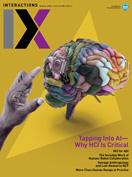Authors:
Marc Hassenzahl, Jan Borchers, Susanne Boll, Astrid Pütten, Volker Wulf
From the command line to today's immersive, tangible, or gesture-based interaction, the evolution of interaction paradigms is a story of increasing embodiment [1]. We predominantly design interactive systems as tools, which withdraw from conscious thought to be always ready-at-hand. In this paradigm, people are at the center of action and use ubiquitous "everyware" technology [2] to extend their minds and bodies. Insights But this paradigm is more and more at odds with what is happening in technology today. New self-learning, proactive, AI-infused systems are no longer tools to act through. When encountering personal assistants, chatbots, smart home devices,…
You must be a member of SIGCHI, a subscriber to ACM's Digital Library, or an interactions subscriber to read the full text of this article.
GET ACCESS
Join ACM SIGCHIIn addition to all of the professional benefits of being a SIGCHI member, members get full access to interactions online content and receive the print version of the magazine bimonthly.
Subscribe to the ACM Digital Library
Get access to all interactions content online and the entire archive of ACM publications dating back to 1954. (Please check with your institution to see if it already has a subscription.)
Subscribe to interactions
Get full access to interactions online content and receive the print version of the magazine bimonthly.






